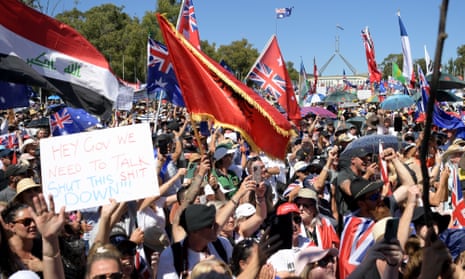The Australian prime minister, Scott Morrison, says he understands the concerns of anti-vaccination mandate protesters, with thousands of people again marching in Canberra.
The protesters marched on Parliament House on Saturday, chanting and waving flags, and shutting down streets around the capital. About 100 people leapt barricades and faced off against police, who were also monitoring the crowd with drones and helicopters.
The protesters appeared to be a mix of anti-vaccine activists, conspiracy theorists and people from the sovereign citizen movement.
Morrison said the protesters were “speaking up for the things they feel strongly about” and asked them to follow police directions.

“Australia is a free country and they have a right to protest,” he said. “I would ask them to do that in a peaceful and respectful way.”
Morrison said the federal government had only ever supported mandates for aged care and disability workers, as well as health workers in high-risk situations.
“All other mandates that relate to vaccines have been imposed unilaterally by state governments,” he said. “They have not been put in place by the commonwealth government ... so I understand their concerns about these issues.”
One Nation senator Pauline Hanson visited the rally and spoke to some of the protesters in the crowd.
Anti-vaccination protesters have been ordered to leave Exhibition Park in Canberra, where they have been staying for more than a week, by Sunday.
The group of protesters have been staying there since they were removed from the lawns of the National Library last week by police.
New South Wales announced a further 32 Covid deaths on Saturday, along with 8,183 new virus cases.
Some 1,650 people are in hospital with Covid in the state, after the number of hospitalisations fell below 2,000 this week for the first time since January.
On Friday, the Aged Care and Community Services chief executive, Paul Sadler, accused the NSW government of knowing the aged sector was unprepared for the Omicron outbreak, but went ahead with relaxing Covid restrictions in December anyway.
But the state’s health minister, Brad Hazzard, who also appeared before a NSW parliamentary inquiry into the government’s response to Covid-19, said there were “constant” discussions with aged care providers. He also denied suggestions that the government had let Omicron “rip” over summer against health advice.
Victoria reported 19 more Covid-related deaths for the 24 hours to Saturday and 7,224 new infections. A total of 79 people were in intensive care and 19 were being ventilated.
The state was now managing 55,102 active cases, with 487 people in hospital – 66 fewer than the day before.
With Covid hospitalisations having halved in the past three weeks, the state government on Friday announced the code brown pandemic alert issued for the health system would be lifted on Monday.
Just spent an hour walking the perimeter of this crowd. It is tightly packed and stretches from Queen Victoria Terrace at the back of Old Parliament House, crosses State Circle and pushes up to the barricades on the road at the forecourt of the new Parliament. @9NewsAUS pic.twitter.com/kLZ7t7X3OQ
— Chris Uhlmann (@CUhlmann) February 12, 2022
Non-urgent elective surgery will also be ramped up from next week, allowing private hospitals in metropolitan areas to perform up to half of all elective surgery, and those in regional Victoria to do 75%.
All other public hospitals in Melbourne will continue to be restricted to emergency and urgent elective surgery, with the health minister to consider further easing next week.
Queensland reported 13 new Covid-related deaths on Saturday and 3,660 new cases. The number was 2,317 fewer than the previous 24 period, when more than 5,900 new cases were reported.
The state’s chief health officer, John Gerrard, said a “technical error” meant the number of cases might not be accurate for the most recent reporting period but it would likely be fixed over the coming 24 hours.
He said the state’s hospitals were performing better than the government’s predictions, an achievement he attributed to vaccination.
“This [variant of the] virus is at least as virulent as the original virus we saw in Italy and New York,” he said. “Were it not for vaccination the situation would have been catastrophic.”
The state is currently managing more than 33,000 active cases of the virus, with 538 people in hospital, and 49 in intensive care.
Of those who died, three were in their 50s and 60s, eight were in their 70s and 80s and two in their 90s.
Six people were unvaccinated against Covid, two had had one dose, four had received two doses and four had received boosters.
South Australia reported one new Covid-related death on Saturday and 1,372 new infections. The death of the woman in her 90s took the state death toll since the start of the pandemic to 149. There were 213 people in hospital with Covid, including 17 in intensive care, with four on ventilators.
The Northern Territory recorded 1,425 new Covid cases on Saturday with 170 people in hospital, two of which were in intensive care.
The ACT reported 428 cases and no fatalities, with 51 people in hospital, three of which were in intensive care.
Tasmania recorded 456 new Covid cases, with 17 people in hospital, one of which was in ICU, while Western Australia reported 27 new cases, down from the 51 recorded on Friday.
Also on Saturday, the federal Australian Medical Association president, Dr Omar Khorshid, launched a campaign pushing for greater hospital funding to be put on the federal election agenda.
Khorshid said public hospitals were in “logjam”, with exhausted staff, long surgery waitlists and emergency departments struggling to meet demand.
Meanwhile, the commonwealth has extended its pandemic emergency measures until 17 April, due to the wave of Covid cases of the Omicron variant.
Emergency requirements will continue, including restrictions on outbound travel for unvaccinated Australians and restrictions on cruise ships entering the country.
Other measures include implementing restrictions to protect remote communities in the Northern Territory and preventing price gouging of rapid antigen tests.
